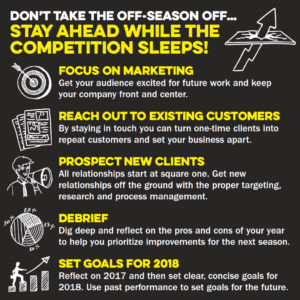 The seasonal nature of the construction industry has historically been a challenge, but it can also be an asset in terms of set-aside time to review, plan, and strategize for the upcoming season. Staying ahead while the competition sleeps is a critical piece to stay ahead of the curve in this fast-paced retail construction environment.
The seasonal nature of the construction industry has historically been a challenge, but it can also be an asset in terms of set-aside time to review, plan, and strategize for the upcoming season. Staying ahead while the competition sleeps is a critical piece to stay ahead of the curve in this fast-paced retail construction environment.
Debriefing – Everyone adds onto their running list of “I wish I had time to….” during the season, so when the season drops off, knock those to-dos off one by one. More than that, take time to dig deep and reflect on the pros and cons of your year to help you prioritize improvements for the next season. Debriefing at the end of a season is a building process that allows time to look at leveraging strengths and honing in on areas of improvement.
Focus on marketing – When the season is in full swing, you’re often too busy to take on any major initiative so this is your time! Continue to create remarkable content, but make it more significant and make your audience get excited for when they can take advantage of your products and services again.
Reach out to existing clients – How will you make sure your customers remember you by the time next season rolls around? Make a point to maintain visibility with clients and be creative in doing so. By staying in touch you can turn one-time clients into repeat customers and set your business apart from others. Lunch platters are always an inexpensive, very personal way to touch base with clients.
Prospect new clients – All relationships start at square one and it is your responsibility to get that relationship off the ground with the proper targeting, research and process management.
- Do your research and target carefully to make sure you’re spending time with the right companies for your business needs.
- Establish a connection and a need, showing that you will not only bring value to the client once you start working with them but right there in the first meeting.
Set goals – After reflecting and debriefing, set clear, concise goals for upcoming season and year. The more measuring you do for your goals (i.e. improve margins to 35% or average customer pay to 20 days), the easier you’ll be able to track performance throughout the busy season. What were we trying to accomplish? Where did we hit (or miss) our objectives? What caused our results? What should we start, stop, or continue doing? Furthermore, allow each employee to focus on their individual growth (both personal and professional goals) so team members learn from themselves and from each other.
